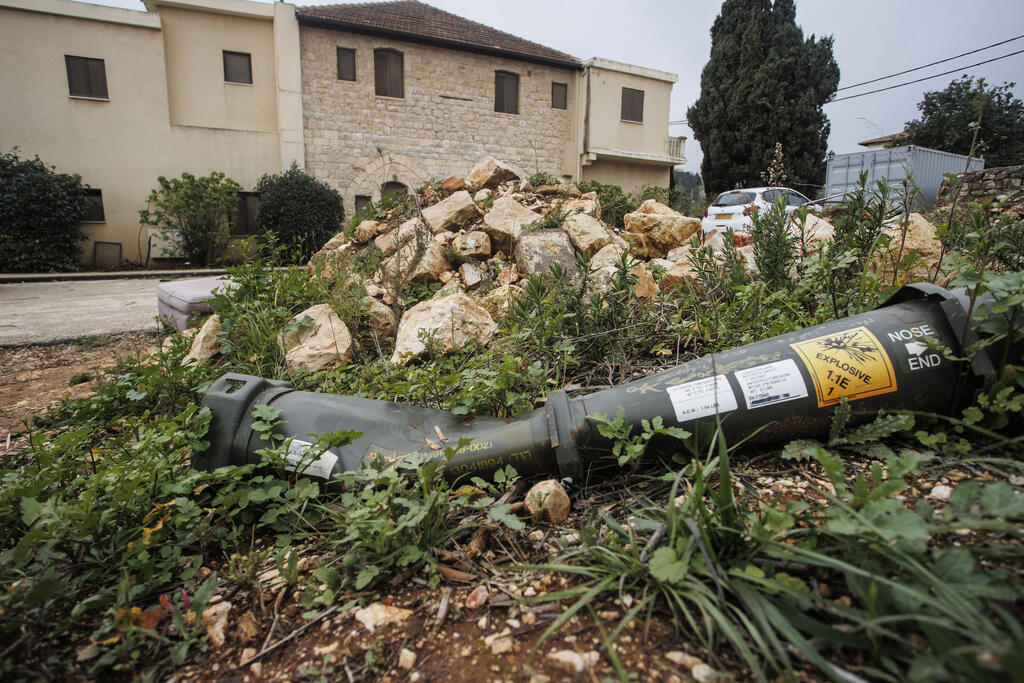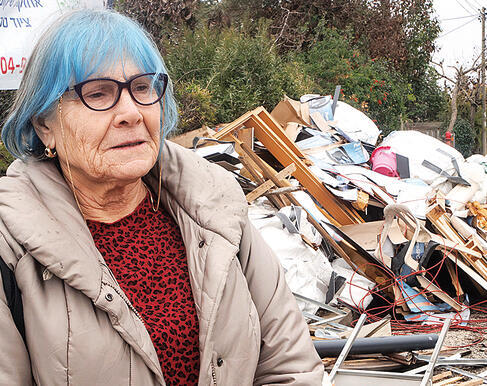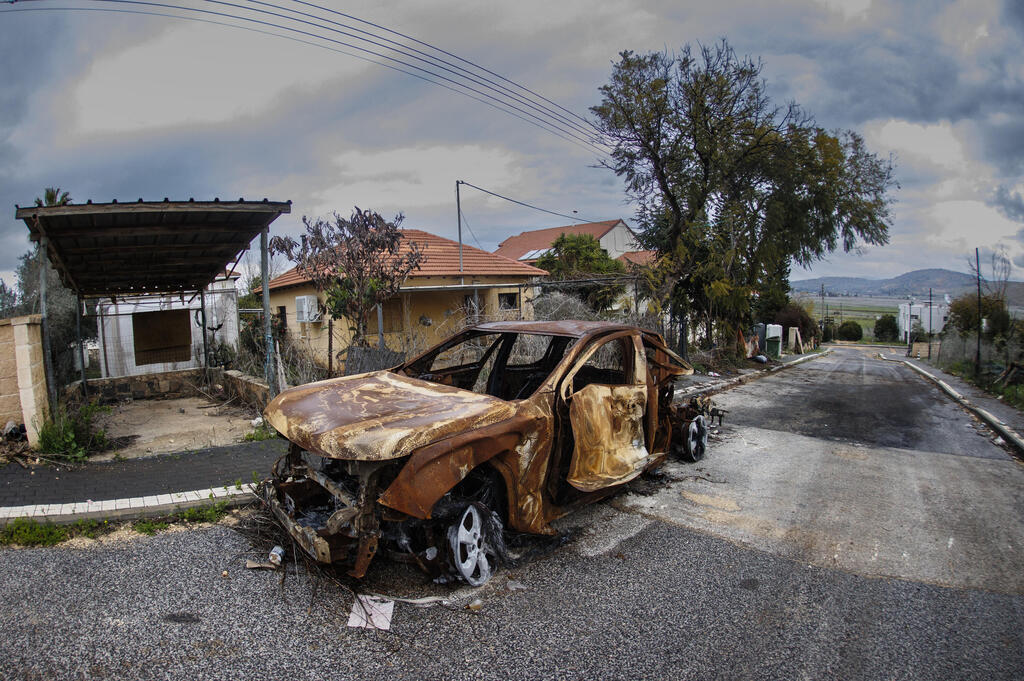Getting your Trinity Audio player ready...
We entered the neglected yard of an old stone house, carefully avoiding the sharp spikes of the barbed wire stretched across the property. A sign at the front of the house tells its story: this is the "Arch House," built in an Arab style in 1900. Its construction sparked heated debates among those who wanted the colony's houses to be built in a European style with tiled roofs and those who sought to blend into the environment by building homes typical of the Levant, with arches and domes. These were the arguments of that time. No one could have imagined back then that, over a century later, Metula would become a military outpost facing Lebanon. Fences would stretch across yards, and sandbags would line shooting positions at street corners.
Today, Metula still bears the scars of war. Two and a half months after the cease-fire on the northern border, the town remains in a state resembling a military outpost. IDF troops have withdrawn from southern Lebanon except for five key outposts. Meanwhile, the army uses Metula as though the war has not ended, with soldiers visible throughout the town.
The government has announced that northern residents evacuated from their homes will return to their communities by March 1. However, none of the ministers have visited the north to assess whether this is even feasible.
On Sunday evening, the IDF announced the lifting of restrictions in the north, the first step in returning residents to their communities. It is the first time since October 7 that all security restrictions have been lifted in communities near the border with Lebanon. Meanwhile, at the end of the month the government will stop distributing the alternative housing grants it has paid to more than 60,000 evacuees from the north.
The Arch House on Rishonim Street serves as one example. A rocket struck its backyard, destroying the porch and igniting a fire that consumed everything there. On the ground, we found discarded ZAKA vests (Search & Rescue organization) and kits for police volunteers. From Rishonim Street, we drove to Lebanon Street, where almost every house sustained damage. Though residents are supposed to return, most homes are abandoned, with some doors left wide open. No repair crews were seen in the area. A completely burned pickup truck still sits unattended.
On the parallel Hermon Street, across from the Katz family home, the sidewalk is piled high with furniture and belongings. The massive pile contains the contents of four houses, according to Orit Katz. She reassures us that the local council will eventually remove it. Katz, a fourth-generation resident of the colony, explains that her grandfather Pesach Winkler came here with his father, Menashe, from Petah Tikva to establish this place.
Pointing to house number 14 on the street, she says: "My husband Kobi and I built this house 50 years ago when we got married. We’ve lived here for 50 years until the war. The house didn’t take a direct hit, but rockets hit neighboring houses, blowing out all our doors, shattering the windows, and ripping off the roof. Rain poured into the house, ruining all the furniture."
Will you manage to renovate by March 1?
“There’s a lot of work to do. When the cease-fire began, my husband immediately came to see what happened to the house. I couldn’t bring myself to look. This is only my second time back, and again, we’re here just to figure out what to do next. My first visit since the evacuation was two and a half weeks ago. I stood at the entrance and couldn’t believe it was my house. I didn’t recognize it—really, I didn’t. How can they expect us to return home by March 1?”
Life as an evacuee
On the way to Metula, we called Mai Shitrit from Kiryat Shmona. The last time we spoke to her, the day after the cease-fire began in November, she was staying at a hotel on the Tel Aviv promenade. She, her husband, and their two young children — one two years old and the other barely a year — were crammed into a tiny hotel room. Shitrit described life in the hotel as unbearable due to the severe overcrowding. They had purchased three plastic storage cabinets, a refrigerator, a toaster, a Ninja pot, and frying pans to cook in their small room because they could no longer stand the hotel food. When asked where they cooked, she replied, “On the balcony overlooking the sea.”
We assumed by now she and her family had returned to Kiryat Shmona. After all, life in a hotel becomes intolerable after a year and a half, and the government’s plan to encourage residents to return includes financial compensation: $4,330 per adult and $2,165 per child for those who return by March 7. Until then, residents can use the funds to prepare their homes for return.
“We haven’t gone back,” she said. “You caught me organizing the mess in the hotel room in Tel Aviv. It’s a nightmare here — wow, you wouldn’t believe how bad it is. But there are no active childcare facilities in Kiryat Shmona. Here, the kids are in a daycare for evacuees in Kerem HaTeimanim, run by three women from Kiryat Shmona who aren’t professional caregivers. One owns a grocery store, another a sandwich kiosk, and the third works in a clothing store. They’ve already told us they’re closing the daycare on the 20th of the month to prepare for their return to Kiryat Shmona.
"Two and a half months have passed since the cease-fire, and no one has contacted us to ease our concerns. No one has told me whether childcare services will even be available in Kiryat Shmona by March 1. I’m afraid to go back. On one hand, I want to return home, but on the other, I’m terrified. I need someone to tell me it’s safe to go back to Kiryat Shmona. Right now, nothing is clear.”
Barriers to education and reconstruction
The Ministry of Education announced this week that only 70% of teachers in evacuated communities have confirmed they will return to teach in the north. This complicates the reopening of educational institutions in Kiryat Shmona and other towns at the beginning of next month, casting doubt on the possibility of a full return to schooling in the coming year. This adds another consideration for evacuees: those who leave hotels or rented homes will receive the maximum compensation. However, those who choose to stay in temporary accommodations will face financial penalties. The longer they delay returning home, the smaller the government payout — eventually reaching zero if they wait until the end of the school year.
David Azulay, head of the Metula local council, hired a lawyer to petition the Supreme Court on behalf of the council and residents, demanding that the government delay the return date for evacuees.
Azulay’s office is still located in one of the shelters in the colony because the council building was hit by a rocket and has yet to be repaired, just like many other damaged buildings in the colony. “Take a look around,” he says, “see for yourselves and then come back and tell me if this is a place people can return to. Metula has 2,400 residents, but only 18 have returned. What, the rest don’t want to come back? They’re dying to come back! But you can’t imagine what’s going on here — the amount of garbage we’ve been clearing out is unimaginable. Just in the past two and a half months, it equals what we’d usually remove in two years.
“A house that has been infested by rats for a year and four months is a ruined house. A house with broken windows, missing tiles, and rainwater pouring in, filling it with mold and mildew — that’s a ruined house. Everything has to be thrown out, and new furniture needs to be purchased. So people are emptying their homes onto the sidewalks. The amount of garbage is insane, and we’re working around the clock with a contractor who brings a loader and a double-trailer truck, and it’s still not enough.”
Rehabilitation delays
Still, here we are, two and a half months after the cease-fire took effect, about two weeks before the scheduled return date, and it doesn’t seem like much progress has been made in repairs and rehabilitation.
“There are still a lot of soldiers here, a massive military presence. You see tank carriers, fuel trucks, jeeps. The reservists themselves come in private vehicles. I’m talking about hundreds of reservists — hundreds. They leave their cars everywhere, and it disrupts our work. In several cases, we’ve asked the army to identify the owners of cars blocking access for contractors who came to repair infrastructure. The army got back to us and said, ‘We checked, the car owners are inside Lebanon, they’ll move them as soon as they come out.’ They’re still inside, and we’re still waiting.
“Residents bring contractors and repairmen to get price estimates and then tell me, ‘What is this, David? Metula looks like a military base.’ Who wants to live on an army base? What, did we sign up for permanent service? The army has spread barbed wire throughout the community and set up shooting positions with sandbag reinforcements, and they haven’t removed any of it.
Get the Ynetnews app on your smartphone: Google Play: https://bit.ly/4eJ37pE | Apple App Store: https://bit.ly/3ZL7iNv
“There are openings in the border fence that the army created to allow tanks and trucks through. Do you know how many stray Lebanese dogs come through those openings? We have a dog catcher who now works full time chasing them. And the most frustrating thing is that there are no educational institutions. The school was hit by a rocket and is under repair. The kindergartens housed hundreds of soldiers and now need renovations. It’s the same with the daycare center. The community center suffered blast damage and isn’t ready either. Some 95 children attended our elementary school, 38 went to kindergartens, and 32 toddlers were in the daycare center. These children are now enrolled in schools in other communities. If nothing is ready here, why would these families come back? What a stupid country!”
Staying behind in Metula
Zehava Neishtain never left Metula, not even for a single day. At 78 years old, she was born in Haifa and has lived here for over 50 years. Her late husband, Ehud, was a fourth-generation descendant of the colony’s founders. She owns a guesthouse with seven rooms, where for several months reservists stayed. “Every time there was a warning, they’d run to the shelter,” she says, “and I’d watch them running while I stayed seated. I’ve never gone to a shelter in all my time in Metula, and I’ve been here since 1969.”
Her daughter, Miri Armon, has had a very different experience. Miri, 47, married a farmer from the Gadera area who followed her to Metula. Together, they grow kiwis, avocados, nectarines, and pecans. They have a house here and three children, but when the war broke out, they left immediately. First, they stayed with family in Ramat Hasharon, then moved to a one-bedroom apartment in Kibbutz Dalia. From there, they fled to a hotel in Haifa, then to a hotel in Tiberias, which they later replaced with another hotel in Tiberias. For almost a year now, they’ve been living in a rented house in Yesod Hama’ala. Since the cease-fire, they’ve been chasing after state authorities. “Our house was damaged by the blast of an anti-tank missile that hit our neighbor’s house,” Miri says. “Doors, tiles and windows were blown off, cracks formed in some walls, air conditioners were destroyed, and the house was left exposed to rats. In short, it needs massive repairs.”
Where a direct hit in Metula took place
(Video: Avihu Shapira)
Have you started renovations?
“We brought in an appraiser who works with the Tax Authority’s property damage division. At the same time, we brought our own contractor to review the damages with the appraiser and understand the scope of the work. The appraiser wrote a report and said he’d submit it to the property damage division, and they’d contact us. The contractor gave us a quote of 120,000 shekels, but we haven’t heard anything from the property damage division, so we can’t start renovations because we don’t have that kind of money.”
Do you even know what the appraiser’s damage assessment was?
“Nothing. There’s a hotline for the property damage division, but no one answers. I’ve tried several times. I turned to the council’s lawyer, who’s helping residents deal with the property damage division, but even he has trouble getting answers. In the meantime, we hired a private lawyer to handle it. It’s been almost three months since we could have started fixing the house, but nothing’s moving. I haven’t heard a word from the state — not a single word!”
Zehava adds: “What a mess this is. In the south, they have the Tkumah Administration that helps residents of the Gaza envelope, but for us in the north, there’s no one to turn to, no address.”
There’s Minister Ze’ev Elkin, who’s responsible for rehabilitating the north.
Zehava: “Where is he? Has anyone seen him?”
The Tax Authority claims that “out of more than 400 claims in Metula alone, over 70% have progressed to the payment stage. This is a relatively fast processing pace, considering that most residents are still evacuated.”
We went to take photos in Zehava’s yard, now full of colorful anemones. Miri mentioned she wants to return to Metula. “I have a family legacy here that goes back to the early days of Zionism,” she said. “I really want to come back. I’m not ashamed to say I’m motivated by Zionism — by staying rooted to the land and to agriculture. But where is the state? We can’t do this alone.”









